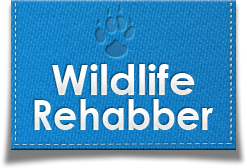Category: Wildlife Information
If you find an orphaned baby wild bird songbird or mammal
Quick Links If You Have Found A Baby Bird If You Have Found A Baby Squirrel If You Have Found A Baby Bunny If You Have Found A Duckling If you have found a species that is not listed above, please contact a Wildlife Rehabilitator by phone (not by email) for specialized assistance. Please do … Continue Reading
Wildlife Transport and Rescue
Here is a compiled list of suggested items for use in transport/rescue and disaster situations. Included are direct links for purchasing some of the products online as well as tips for making some of the items and their use. Feel free to send in your tips and suggestions. We’ve tried to source the least expensive … Continue Reading
Humane Use Of Live Animal Traps
Trapping Is Not A Quick Fix Most homeowners immediately want the animal removed and relocated, which they feel is a quick solution for them and they believe it is a humane alternative for the animal. Animals are attracted to your property for one of many possible reasons; these might include food, shelter, water, and safe … Continue Reading
Nuisance Small Mammals
See the table at the bottom of this page for common problems and recommended solutions This article addresses come common issues related to nuisance small mammals. Most homeowners take it personally when encountering nuisance wildlife problems. They think the animal is being malicious. We already know that people/neighbors don’t respect personal property or boundries. So … Continue Reading
Release Criteria
A good rehabilitator agonizes over the following release criteria. You should be losing sleep like the rest of us, if you haven’t met each ofthe requirements. If you answer no to any of the following (with the exception of appropriateness for species), you should seriouslyreconsider your decision to release. Is it cautious of all humans … Continue Reading
Raising Muscovy Ducklings
Please be advised that federal regulations prohibit the release of domestic waterfowl. If you are raising muscovies, ensure that you are able to keep them or that you can secure permanent homes for them Housing: under 3 weeks old (under 6 inches in length): In a small indoor cage with access to a heating pad … Continue Reading
New Rehabber Self-Assessment Quiz
Volunteering in any capacity is a big commitment, not only on your part but also on the part of all the people commited to providing you with training, permitting and support. Here is a list of questions to help you assess if this is the right field for you. They include the reasons that most … Continue Reading
Duck – Goose Egg And Nest Information
Mallard Duck And Goose Nesting Behavior Information Males and female mallards and geese pair up in late fall. Nesting begins in early to mid Spring. Duck and goose nests are usually made away from the duck or goose’s main body of water. The male and female will scout out the nest site together, looking for … Continue Reading
